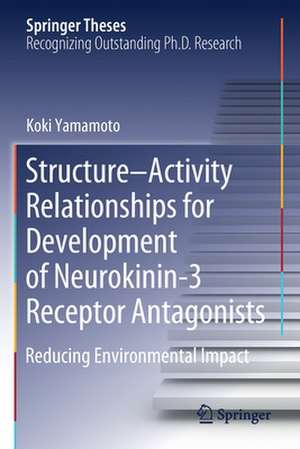Structure–Activity Relationships for Development of Neurokinin-3 Receptor Antagonists: Reducing Environmental Impact: Springer Theses
Autor Koki Yamamotoen Limba Engleză Paperback – 24 ian 2021
This book explores the possible development of neurokinin-3 receptor (NK3R) antagonists with reduced environmental impact.
Pharmaceuticals are used to cure diseases and to alleviate symptoms in humans and animals. However, the stable, bioactive substances excreted by patients have unfavorable effects on non-target species. To overcome these disadvantages of these highly stable, potent substances, drug design to turn off bioactivity after release into the environment is needed.
The book describes the development of eco-friendly NK3R antagonists by introducing a labile functional moiety and substituting a scaffold. This resulted in a novel NK3R antagonist that oxidized into its inactive form when exposed to air. Further, the book presents an efficient and easily achievable synthetic method of creating triazolopiperazine scaffolds, as well as a structure–activity relationship study involving scaffold hopping for decomposable motifs, which led to a novel photodegradable NK3R antagonist.
Demonstrating that it is possible to develop compounds that convert into their inactive forms under environmental conditions, this book is useful for anyone interested in therapeutic agents with reduced environmental impact.
| Toate formatele și edițiile | Preț | Express |
|---|---|---|
| Paperback (1) | 630.75 lei 6-8 săpt. | |
| Springer Nature Singapore – 24 ian 2021 | 630.75 lei 6-8 săpt. | |
| Hardback (1) | 636.94 lei 6-8 săpt. | |
| Springer Nature Singapore – 24 ian 2020 | 636.94 lei 6-8 săpt. |
Din seria Springer Theses
- 18%
 Preț: 997.88 lei
Preț: 997.88 lei -
 Preț: 389.88 lei
Preț: 389.88 lei - 15%
 Preț: 646.94 lei
Preț: 646.94 lei - 18%
 Preț: 943.43 lei
Preț: 943.43 lei -
 Preț: 399.29 lei
Preț: 399.29 lei - 18%
 Preț: 944.99 lei
Preț: 944.99 lei - 15%
 Preț: 636.80 lei
Preț: 636.80 lei - 18%
 Preț: 941.05 lei
Preț: 941.05 lei - 15%
 Preț: 643.16 lei
Preț: 643.16 lei - 15%
 Preț: 642.68 lei
Preț: 642.68 lei - 18%
 Preț: 1103.62 lei
Preț: 1103.62 lei - 20%
 Preț: 558.82 lei
Preț: 558.82 lei - 18%
 Preț: 1112.30 lei
Preț: 1112.30 lei - 18%
 Preț: 944.19 lei
Preț: 944.19 lei - 18%
 Preț: 1109.92 lei
Preț: 1109.92 lei - 18%
 Preț: 1217.27 lei
Preț: 1217.27 lei - 15%
 Preț: 640.06 lei
Preț: 640.06 lei - 15%
 Preț: 636.45 lei
Preț: 636.45 lei - 15%
 Preț: 640.06 lei
Preț: 640.06 lei - 15%
 Preț: 640.88 lei
Preț: 640.88 lei -
 Preț: 389.70 lei
Preț: 389.70 lei - 20%
 Preț: 563.89 lei
Preț: 563.89 lei -
 Preț: 393.35 lei
Preț: 393.35 lei - 15%
 Preț: 637.93 lei
Preț: 637.93 lei - 15%
 Preț: 641.85 lei
Preț: 641.85 lei - 18%
 Preț: 1225.94 lei
Preț: 1225.94 lei - 20%
 Preț: 551.36 lei
Preț: 551.36 lei - 18%
 Preț: 1229.10 lei
Preț: 1229.10 lei - 15%
 Preț: 639.25 lei
Preț: 639.25 lei - 18%
 Preț: 999.45 lei
Preț: 999.45 lei - 15%
 Preț: 640.06 lei
Preț: 640.06 lei - 18%
 Preț: 1220.45 lei
Preț: 1220.45 lei - 18%
 Preț: 1116.26 lei
Preț: 1116.26 lei - 18%
 Preț: 1110.72 lei
Preț: 1110.72 lei - 18%
 Preț: 1000.87 lei
Preț: 1000.87 lei - 18%
 Preț: 891.17 lei
Preț: 891.17 lei - 15%
 Preț: 640.06 lei
Preț: 640.06 lei - 5%
 Preț: 1154.07 lei
Preț: 1154.07 lei - 15%
 Preț: 635.96 lei
Preț: 635.96 lei - 15%
 Preț: 640.88 lei
Preț: 640.88 lei -
 Preț: 387.20 lei
Preț: 387.20 lei - 18%
 Preț: 1109.92 lei
Preț: 1109.92 lei -
 Preț: 385.25 lei
Preț: 385.25 lei -
 Preț: 385.25 lei
Preț: 385.25 lei - 18%
 Preț: 1112.30 lei
Preț: 1112.30 lei - 18%
 Preț: 999.45 lei
Preț: 999.45 lei -
 Preț: 386.99 lei
Preț: 386.99 lei - 15%
 Preț: 637.13 lei
Preț: 637.13 lei - 20%
 Preț: 554.20 lei
Preț: 554.20 lei - 20%
 Preț: 555.57 lei
Preț: 555.57 lei
Preț: 630.75 lei
Preț vechi: 742.06 lei
-15% Nou
Puncte Express: 946
Preț estimativ în valută:
120.71€ • 124.70$ • 100.46£
120.71€ • 124.70$ • 100.46£
Carte tipărită la comandă
Livrare economică 25 martie-08 aprilie
Preluare comenzi: 021 569.72.76
Specificații
ISBN-13: 9789811529672
ISBN-10: 9811529671
Ilustrații: XII, 86 p.
Dimensiuni: 155 x 235 mm
Greutate: 0.15 kg
Ediția:1st ed. 2020
Editura: Springer Nature Singapore
Colecția Springer
Seria Springer Theses
Locul publicării:Singapore, Singapore
ISBN-10: 9811529671
Ilustrații: XII, 86 p.
Dimensiuni: 155 x 235 mm
Greutate: 0.15 kg
Ediția:1st ed. 2020
Editura: Springer Nature Singapore
Colecția Springer
Seria Springer Theses
Locul publicării:Singapore, Singapore
Cuprins
1. Introduction.- 2. Development of NK3R Antagonists with a Labile Functional Group in the Natural Environment.- 3. Development of NK3R Antagonists with a Degradable Scaffold in the Natural Environment: Synthesis and Application of Fused Piperazine Derivatives for Investigation of Degradable Core Motifs.- 4. Development of NK3R Antagonists with a Degradable Scaffold in the Natural Environment: Identification of NK3R Antagonists with a Decomposable Core Structure by Scaffold Hopping.- 5. Conclusion.
Recenzii
Textul de pe ultima copertă
This book explores the possible development of neurokinin-3 receptor (NK3R) antagonists with reduced environmental impact.
Pharmaceuticals are used to cure diseases and to alleviate symptoms in humans and animals. However, the stable, bioactive substances excreted by patients have unfavorable effects on non-target species. To overcome these disadvantages of these highly stable, potent substances, drug design to turn off bioactivity after release into the environment is needed.
The book describes the development of eco-friendly NK3R antagonists by introducing a labile functional moiety and substituting a scaffold. This resulted in a novel NK3R antagonist that oxidized into its inactive form when exposed to air. Further, the book presents an efficient and easily achievable synthetic method of creating triazolopiperazine scaffolds, as well as a structure–activity relationship study involving scaffold hopping for decomposable motifs, which led to a novel photodegradable NK3R antagonist.
Caracteristici
Nominated as an outstanding Ph.D. thesis by Kyoto University Presents a new concept of drug design to reduce environmental impact Shows how structure–activity studies help to design eco-friendly drugs
